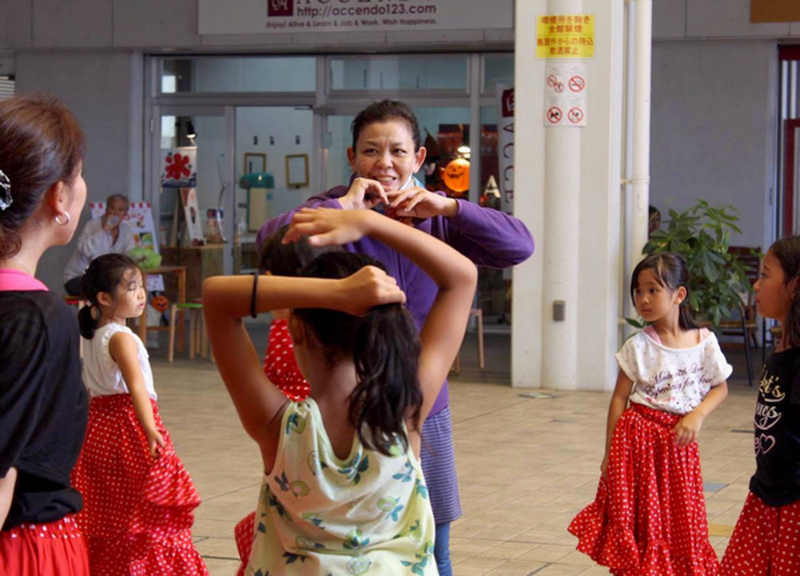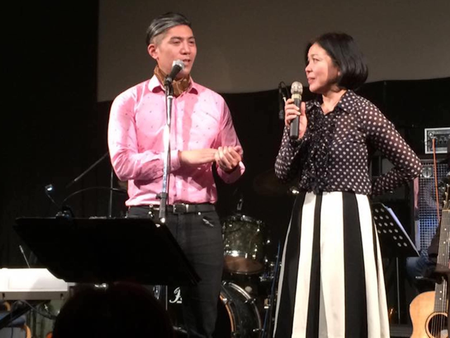The Pure Nikkei Society
There is a music event where Nikkei musicians deal with the concept, “Enrich the world with Latin and Okinawan fusion”, and it is called Okinawa Latina. The founder is the lead vocalist of the Latin rock band Diamantes, who is also a Sansei (third generation) Japanese Peruvian, Alberto Shiroma. We asked Yuko Nakasone, who has been the producer of Okinawa Latina since 2016, about the event’s history and her relationship with the Nikkei society.
Yuko received the opportunity to join Okinawa Latina when she was asked to prepare a proposal by Alberto in 2015, when he launched the event. In 2016, she became the representative and producer. The 2nd Okinawa Latina event was held in Okinawa as a collaboration with the World Uchinanchu Festival, which was held that same year. The World Uchinanchu Festival is held once every 5 years and this meant that Uchinanchus from all over the world would gather in Okinawa. This year, Sansei Gus Hokama from Argentina was invited as the special guest.
In regards to Gus, Yuko said, “I was completely shocked when I first heard him sing.” Her first encounter with Gus was in 2015, when he came to Kitanakagusuku, Okinawa as an international student for 3 months, where Yuko resides. This is when she was introduced to one of his songs, Entre Claveles (Among Carnations). With much respect toward his grandparents, the motif of the song was to express the history of his grandparents who experienced the hardships of traveling from Okinawa to Argentina on an immigrant ship, as well as the many struggles they faced in a new land cultivating carnations while providing for their children and grandchildren. In the past, there have been many immigrant-themed songs singing about sorrows and desires to return to their home country, but Gus’s song was different. He put his lyrics to a slow, upbeat melody which was not filled with sorrow, but instead filled with expectations to one day visit the home country of his grandparents.
Today, Yuko, who is Gus’s producer, discovered something in common within the Sansei and Yonsei (fourth generation) Nikkei musicians. “While embracing the culture of the country they were born in, their feelings of their Okinawan or Japanese roots are purely fused in their music. I believe that from their music you can feel the young Nikkei generation as they are, that is, their genuine form. And honestly, this style does not exist neither in Okinawa nor Tokyo. It’s a totally new genre.”
Yuko is now on a mission to let the world know about the power these young Nikkeis have within them.
“Whether it be in Japan or Argentina, at every live performance that Gus has done, I also go up on stage and talk about the ‘magic found in the Nikkei but not in the Japanese.’ The reason is because I believe that neither the Japanese nor Nikkei have noticed what is it. If the Japanese would realize this, it would lead to Japanese pride. Kazuo Ishiguro, who was awarded the Nobel Prize for literature last year, is Japanese-British from Nagasaki. It has been said that his work would not have been possible had he not had his Japanese background. The press picked up this news because his accomplishments became a source of ‘Japanese Pride’.”
Having the same roots, although being raised in different cultures, if the Japanese and Nikkei recognized each other, it would lead to the creation of a more friendly country, and if they could cooperate with each other, Yuko believes it’s possible to create a powerful performance. “In the near future, we will reach out to all Nikkei musicians worldwide and hold a music festival in Tokyo or create a musical performance with the Nikkei as the main focus.” In this way, even more power comes to the word “Nikkei.”
Okinawa and Japan seen from Peru
Yuko was born in Okinawa. Her grandparents were the first generation to immigrate to Peru. She grew up surrounded by rare items her relatives sent from abroad. She has a memory that she recalls as if it were yesterday, being in Naha Airport when her grandparents returned to their home country after 35 years. Yuko was six years old. When she and her relatives spotted their grandparents at the airport lobby, they all greeted them by dancing kachashi (the Okinawan dance of joy) and finger whistles echoed. “My grandparents were also lured in and danced, and by the end it was all tears and strong hugs. Thinking back on it now, this is the first time I saw the expressions of bonds with such intensity.”
After Yuko quit her job of 18 years in Tokyo at a television program production, she took the opportunity to travel to Peru. Ten of her relatives lived under one roof. She only knew three of them. Most did not speak Japanese but even so, she planned to stay for 3 months for just one reason: they are family. She never imagined that it would be this difficult to learn the language, but to do so the right way, she decided she must learn about the real Peru and its roots, and kept pushing back her date of return.
Fortunately, she noticed that within Peruvians, the conversation would rise when the topic was about food, giving her the opportunity to improve her Spanish. “I was learning about a lot of Peruvian dishes, and the more I learned, the more appealing it became. Plus, I was extremely overwhelmed by the concept the nation has that “Peruvian food is the best in the world.” Later on she took on the title of “Peruvian Cuisine Explorer” and began to focus on that one aspect of Peru.
Through this, she experienced a fortunate encounter through food. She was able to meet Chef Gastón Acurio, who revitalized the country with Peruvian cuisine. In 2008, he made Peruvian cuisine a worldwide craze, and even within the country, those who were exhausted by a history of terrorism and economic turbulence were able to regain pride for their country once more. Mr. Acurio also established an academy to teach top class cuisine to the youth in poverty and later send them to countries all over the world. Yuko, who has interviewed Mr. Acurio numerous times, says she felt his spirit of bringing change to the country through cuisine, bringing to mind “If the strategy is serious, it will move the country,” an actual sensation. Along with this, the “strength to survive” of the Nikkei and Japanese people living in Peru is felt through its influence on the world of Peruvian cuisine.
At the same time, Yuko had the opportunity to see Japan and Okinawa from the Peruvian perspective and came to the following thought: “In Spanish, Japan is Japón and people from Okinawa are called Okinawense. In the Nikkei society, Japón and Okinawense are often heard. But before I came to Peru, how many times a year did I think about my family in Peru? Probably once a year. Maybe when we received a phone call from for New Year's. On the other hand, Nikkeis are always thinking about their family in Japan and Okinawa throughout their whole life.” This thought was stuck in her head and she felt the need to know more about the Nikkei society.
However, things changed when she received word that her parents in Okinawa were hospitalized, which gave her no choice but to go back home. At this point, it had already been 4 years since she arrived in Peru.
Today, Yuko is a producer of music and events that bring the Nikkei’s music out to the world, and she believes we must not forget the great benefits Nikkeis have brought to Japan.
“Nowadays, there are many people who are not aware of Japan’s history of migration. The fact is that we are able to live peacefully thanks to the national policy of the immigration system and those who immigrated with the subsequent invitation in Japan’s difficult ages. Very shortly after the war, over 60% of the economy was supported by the Japanese foreign immigrants overseas. I believe in the power of music, I think that the Nikkei’s music will be the open door to begin to describe such complex history.”
Currently, the core of the Nikkei society are now Sansei and Yonsei. In the near future, it will shift to the Gosei (fifth generation) and Rokusei (sixth generation), meaning their feelings towards Japan might fade or become really low. Yuko believes this might the last chance to connect the Nikkei society and Japan now. She has high hopes that the word “Nikkei” will penetrate the world.
© 2018 Keiko Fukuda







